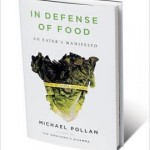
In Defense of Food – An Eater’s Manifesto
By Michael Pollan
It’s hard to know where to start with this book review. Pollan touches on so much; the term “manifesto” in the title is no understatement. And yet throughout the twists and turns that explore our perceptions of and our relation to food, Pollan always remains squarely focused on his one, simple, yet surprisingly challenging credo:
Eat food. Not too much. Mostly plants.
Pollan begins with the demise of Mom as controller, boss and decision-maker over the evening meal. When we as a society replaced Mom’s authority over our food choices with advice from scientists and food marketers, we all began to suffer. After all, who really had our best interest at heart?
For decades now, big agriculture has focused on growing produce with synthetic chemicals and raising livestock on pharmaceuticals. The goal is return, quantity and profit. The side effect of this is that our food has been transformed from something we could identify (…grape, …cow) and eat without worry, to the confusingly refined, enriched and modified cacophony of chemicals that we call food today.
To help us understand these food-like substances, we have turned to the professionals for guidance—government food guides, dieticians, nutritionists, trainers and celebrities (who learned from nutritionists and trainers). And so we learned about nutrients and micronutrients, and now we worry over vitamin D, anti-oxidants and essential fatty acids.
Pollan uses the term nutritionism to describe this focus on nutrients and our tendency to break our food down into its parts. He asks his readers to return to seeing food as something that is whole in itself, not a series of parts. Eat an apple not because it contains vitamin C and a nice mix of soluble and insoluble fibre, but because apples are good for you and we know this from millennia of eating them.
With food science in its infancy, Pollan suggest we revert our trust to our traditional food knowledge. The eating habits of our grandparents and ancestors allowed them to survive because the methods were tried and true. The diversity of traditional diets (Greek, French, Japanese, Indian, Mexican, whatever) is proof it’s possible to nourish ourselves from a huge range of different foods—as long as they are food.
In the west, our current dietary focus on processed corn, wheat and soy is a direct result of what’s easy and fast to grow, ship and store. The apparent focus of our agricultural system on quantity over quality, and the goal to produce as many calories per acre as possible, regardless of nutritional value, is leading us down the garden path and straight into the arms of our Western diseases: obesity, diabetes, hypertension, and heart disease.
Instead of chasing elusive super foods to cure our ills, Pollan asks us to re-visit our perception of one of the most basic necessities of life. Is more necessarily better? Are new scientific discoveries more reliable than traditional knowledge? Who really should be deciding what goes into your stomach?
This is, needless to say, a must read.